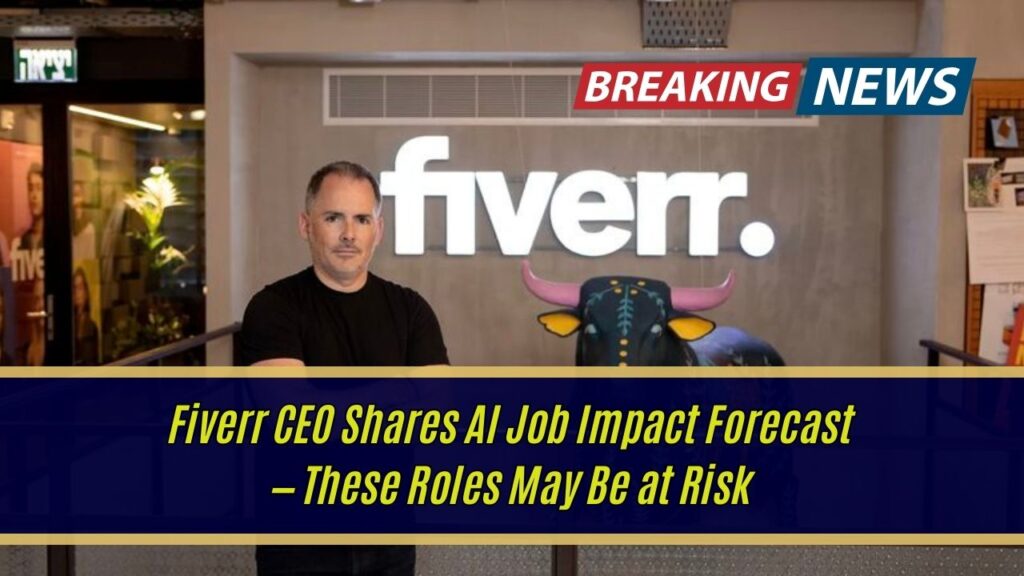Fiverr CEO Shares AI Job Impact Forecast – Artificial Intelligence (AI) is rapidly transforming the job landscape, and Fiverr CEO Micha Kaufman has issued a stark warning: “AI is coming for your jobs. Heck, it’s coming for my job too.” In a candid internal memo shared publicly, Kaufman emphasized the urgent need for professionals to adapt to the evolving technological landscape or risk obsolescence.

This article delves into the implications of Kaufman’s message, identifies roles most susceptible to AI disruption, and offers practical advice for professionals to future-proof their careers.
Fiverr CEO Shares AI Job Impact Forecast
| Aspect | Details |
|---|---|
| CEO’s Warning | Micha Kaufman warns that AI threatens all professions, including his own, urging immediate adaptation. |
| Roles at Risk | Programmers, designers, product managers, data scientists, lawyers, customer support reps, salespeople, and finance professionals. |
| Urgency | Professionals must become exceptional in their fields or face potential career changes within months. |
| Adaptation Strategies | Master relevant AI tools, develop proficiency in prompt engineering, and integrate AI into daily workflows. |
| Industry Reactions | Other tech leaders echo similar sentiments, emphasizing the need for AI integration and upskilling. |
| Official Resources | Fiverr Official Website |
The integration of AI into various industries is inevitable, and professionals must adapt to this changing landscape. By embracing AI tools, developing new skills, and remaining flexible, individuals can not only safeguard their careers but also thrive in the evolving job market.
The choice ahead is clear: either adapt and lead the change or resist and risk obsolescence.
Understanding the AI Disruption
Kaufman’s message underscores a pivotal shift: tasks once deemed “easy” are being automated, “hard” tasks are becoming easier, and previously “impossible” tasks are now achievable with AI. This evolution necessitates a reevaluation of job roles and the skills required to perform them.
Importantly, AI doesn’t just eliminate jobs—it transforms them. The value of human input is shifting from manual execution to creativity, strategy, and oversight of automated systems.
Roles Most Susceptible to AI
Kaufman identifies several professions at heightened risk due to AI advancements:
- Programmers: AI tools can now generate code snippets and debug, reducing the need for manual coding.
- Designers: Automated design platforms can create visuals with minimal human input.
- Product Managers: AI can analyze market trends and customer feedback to inform product decisions.
- Data Scientists: Machine learning algorithms can process and interpret vast datasets efficiently.
- Lawyers: AI can review contracts and legal documents, identifying key clauses and potential issues.
- Customer Support Representatives: Chatbots and virtual assistants can handle routine inquiries.
- Salespeople: AI can analyze customer data to predict purchasing behavior and personalize marketing.
- Finance Professionals: Automated systems can manage transactions, budgeting, and financial forecasting.
These roles involve tasks that are increasingly being automated, making it imperative for professionals in these fields to adapt.
Emerging AI-Resistant Career Paths
While some roles are at risk, others are rising in demand thanks to AI. Here are a few examples:
- AI Ethics Officers: Professionals who ensure AI development aligns with legal and ethical standards.
- Prompt Engineers: Experts in crafting effective inputs for large language models.
- AI Trainers: Individuals who train and fine-tune AI systems using domain-specific data.
- AI-Augmented Healthcare Workers: Medical staff using AI tools for faster diagnostics, yet relying on human judgment.
- Human-AI Collaboration Experts: Those who design workflows where humans and AI systems complement each other.
Strategies for Adaptation
To remain relevant in an AI-driven job market, professionals should consider the following steps:
1. Master Relevant AI Tools
Familiarize yourself with AI tools pertinent to your field. For instance:
- Programmers: Tools like Cursor can assist in code generation and debugging.
- Customer Support: Platforms like Intercom Fin can automate responses to common queries.
- Legal Professionals: Lexis+ AI can aid in legal research and document analysis.
By integrating these tools into your workflow, you can enhance efficiency and stay ahead of the curve.
2. Develop Proficiency in Prompt Engineering
Understanding how to effectively communicate with AI models is crucial. Prompt engineering involves crafting inputs that yield the desired outputs from AI systems. This skill ensures that you can leverage AI tools to their fullest potential.
3. Integrate AI into Daily Workflows
Identify repetitive or time-consuming tasks in your routine that can be automated. By delegating these tasks to AI, you can focus on more strategic and creative aspects of your role.
4. Continuous Learning and Upskilling
Stay updated with the latest developments in AI and your industry. Engage in online courses, workshops, and seminars to acquire new skills and knowledge. Platforms like Coursera, Udemy, and LinkedIn Learning offer a plethora of resources.
Industry Reactions
Kaufman’s warning aligns with sentiments from other tech leaders. Duolingo CEO Luis von Ahn and Shopify CEO Tobi Lütke have also highlighted AI’s potential to replace human roles, urging employees to embrace AI tools to stay competitive.
However, some critics argue that such messages may be alarmist or shift responsibility for job security onto individual workers. They caution against using AI as a pretext for workforce reductions without adequate support for employee retraining and upskilling.
Hiring in 2025 Is Changing — Why Skills Now Matter More Than Degrees
5 AI Interview Tools Helping Candidates Land Jobs Faster in 2025
Google’s NotebookLM Can Now Read Notes in 50 Languages – Check Out This Powerful Upgrade
FAQs about Fiverr CEO Shares AI Job Impact Forecast
Q1: Is AI going to replace all jobs?
A: Not all jobs will be replaced, but many will evolve. Tasks that are repetitive and rule-based are more susceptible to automation. However, roles requiring creativity, emotional intelligence, and complex decision-making are less likely to be fully automated.
Q2: How can I determine if my job is at risk?
A: Assess the tasks involved in your role. If a significant portion involves repetitive, predictable tasks, it’s more likely to be affected by AI. Staying informed about AI developments in your industry can also provide insights.
Q3: What skills should I focus on to remain relevant?
A: Emphasize skills that complement AI, such as critical thinking, creativity, emotional intelligence, and adaptability. Additionally, gaining proficiency in using AI tools relevant to your field can enhance your value.
Q4: Are there resources to help me learn about AI?
A: Yes, numerous online platforms offer courses on AI and related skills. Websites like Coursera, Udemy, and LinkedIn Learning provide a range of options.
Q5: What industries are safest from AI disruption?
A: Jobs in skilled trades (e.g., plumbing, electrical work), emotional care (e.g., therapy, nursing), and creative strategy roles (e.g., brand storytelling) are less susceptible due to their human-centric or highly variable nature.










